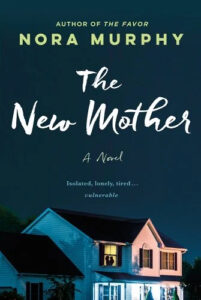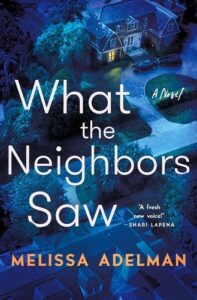 Nora: Hi Melissa! It is so nice to chat with you again. Your debut novel, What the Neighbors Saw, is about Alexis, a successful consultant, pregnant with her second child, who purchases a fixer-upper with her husband, Sam—the worst house in the best neighborhood. They are welcomed by their picture perfect neighbors, most notably, Blair, with whom Alexis develops a friendship after Blair’s husband, Teddy, is found dead. I raced through this book, desperate to find out who killed Teddy and why.
Nora: Hi Melissa! It is so nice to chat with you again. Your debut novel, What the Neighbors Saw, is about Alexis, a successful consultant, pregnant with her second child, who purchases a fixer-upper with her husband, Sam—the worst house in the best neighborhood. They are welcomed by their picture perfect neighbors, most notably, Blair, with whom Alexis develops a friendship after Blair’s husband, Teddy, is found dead. I raced through this book, desperate to find out who killed Teddy and why.
The book takes place in a well-off American suburb, specifically a northern Virginia community, outside of Washington, D.C. What made you choose to set What the Neighbors Saw in suburbia—i.e., a community outside of D.C., rather than within the city?
 Melissa: I’m so happy to be having this conversation with you Nora! Having lived in the suburbs for the past several years, I find them to be full of tensions that serve a domestic suspense plot well. The trappings of stable family life—home ownership, dogs, routines—juxtaposed against dark family secrets…The veneer of community cracking under stress to reveal neighbors’ biases and suspicions…I love that sort of thing. Specifically, in What the Neighbors Saw, Alexis is navigating this new world she’s worked so hard to access but feels out of place in as a Black woman, fearing that her suburban dream may turn out to be a nightmare. Your two novels, The Favor and The New Mother, are also set in the suburbs, and both tackle tough domestic issues with unflinching, super sharp narratives. How did you choose your settings? And how do the suburban settings in both books enable you to dive into the social issues that you tackle?
Melissa: I’m so happy to be having this conversation with you Nora! Having lived in the suburbs for the past several years, I find them to be full of tensions that serve a domestic suspense plot well. The trappings of stable family life—home ownership, dogs, routines—juxtaposed against dark family secrets…The veneer of community cracking under stress to reveal neighbors’ biases and suspicions…I love that sort of thing. Specifically, in What the Neighbors Saw, Alexis is navigating this new world she’s worked so hard to access but feels out of place in as a Black woman, fearing that her suburban dream may turn out to be a nightmare. Your two novels, The Favor and The New Mother, are also set in the suburbs, and both tackle tough domestic issues with unflinching, super sharp narratives. How did you choose your settings? And how do the suburban settings in both books enable you to dive into the social issues that you tackle?
Nora: I completely agree with you. I love how suburbia offers the opportunity to dive beneath a placid, bucolic, and picture-perfect veneer. The characters in domestic suspense novels can be anyone. They could be anyone’s neighbor, friend, a person in line in front of you at the grocery store. How little we know about the people who live so close? All of my protagonists are professional, suburban women who seem like they have lovely lives. But each has a secret. In The Favor, it was that Leah and McKenna were both suffering from intimate partner abuse perpetrated by their husbands. In The New Mother, Natalie is struggling with postpartum mental health issues. Yet, to their neighbors, they look happy and well. I thought suburbia lent itself well to tackling these issues, and to exhibiting how things aren’t always as they may seem. I think it’s interesting how suburbia evokes thoughts of peace and perfection. As you said, in What the Neighbors Saw, Alexis maintains a “suburban dream,” and she had a different upbringing from the one she is seeking to provide for her own children. Her desire to fit in and to build a comfortable life for herself and her kids is palpable and so sharply observed. How do you think her background comes into play as she pursues that “perfect” suburban existence?
Melissa: Yes! A scene I loved in The Favor was early on in the liquor store, where Leah notices McKenna. To a casual observer, it would look like two conventionally successful women out buying supplies for suburban get-togethers, but there’s so much going on just beneath the surface. For me, What the Neighbors Saw is also very much about that gap between how we present ourselves and what’s really going on. Alexis has always lived as an outsider – a scholarship student at elite schools, a college kid with nowhere to go for the holidays, a young professional navigating the world without anyone giving advice or support. But she’s kept going, trying to succeed and live a better life. Moving to an upscale neighborhood is supposed to be the fulfillment of those efforts, but when she gets there, she’s deeply uncomfortable because she still feels out of place in this mostly white, wealthy community. That outsider perspective ends up being valuable, though, as it makes her keep a wary eye on her new neighbors and notice the shadows beneath the perfect surface. Speaking of which, I love how your books use the physical and visual proximity of suburban houses both as a catalyst for neighbors to become entwined with each other and as a point of contrast, showing how you can be so physically close to someone but choose to “look the other way”. How do you think of the roles neighbors can play and the concept of “community” in a domestic suspense?
Nora: That is such an interesting point. Depending on the proximity of the suburban homes, neighbors can see and hear quite a lot, and can then make a choice when those perfect exteriors seem to fracture. Intervene? Offer help? Or look the other way? In The Favor, once Leah recognizes similarities between herself and McKenna, she’s able to covertly observe her, to confirm her suspicions, until she ultimately intervenes in what becomes the catalytic event in the novel. In The New Mother, Natalie is struggling with an extremely difficult baby. She takes him for walks, seeking this idyllic version of maternity leave where she pushes a snoozing baby around her neighborhood in his stroller. But he screams on their walks, and she feels judged by certain neighbors, until one chooses to help her. This ultimately goes horribly wrong for Natalie. Of course, in domestic suspense novels, neighbors take on even more interesting roles than in typical reality, and can be far more than simply observers. They can be the culprits. They can misconstrue things, which can create more drama. The possibilities are endless. I love that about suburban settings—they’re so familiar and comfortable, yet you can take plots to the ridiculous and extreme. This genre has become my favorite over the last few years. And to that point, are there any domestic suspense novels or shows you have really enjoyed recently, which have inspired your writing?
Melissa: Yes and yes! Book-wise, I recently had the opportunity to do an event with Stacy Willingham at Buxton Books in Charleston, South Carolina. Her two domestic suspense novels both have these evocative Southern settings that act almost like characters in the story that you need to keep your eye on—shadowy and lurking, humid and oppressive and vaguely menacing. TV-wise, I absolutely loved the Netflix series Beef, which is a darkly funny and very wacky story of two people whose lives become intertwined in a suburban home improvement store parking lot road rage incident. The show is so original and smart in how it portrays class, race, sex, family dysfunction, and a dozen other aspects of modern adult life. It’s inspired me to lean into my weird ideas! What about you Nora, what have been your sources of inspiration lately—books, tv, walks around your neighborhood? ?
Nora: I haven’t seen Beef, but I’ve wanted to try it. My very young children ensure that I watch almost no television. I definitely spend most of my time working in my home office, where the windows overlook our cul-de-sac and street, so I do like looking outside, although my neighborhood is quite boring. I guess that’s a good thing! Recently, I read The Quiet Tenant by Clemence Michallon. One of the points-of-view in the novel is from a woman being held captive by a serial killer. She is kept hidden away inside a shed, and then a bedroom within a house, being controlled in plain sight. I found it incredibly suspenseful and unique.
Melissa Adelman was born and raised in the Washington, D.C. area, a first-generation American with parents from Haiti and Chile. When she is not traveling the world for her job as an international development economist, her favorite place to be is at home, an old house full of surprises just outside D.C. Melissa lives with her husband, two energetic little boys, and a long-suffering shih tzu. She holds a Ph.D. and B.A. in economics from Harvard University. Her debut novel, What the Neighbors Saw, is now available from Minotaur.
Nora Murphy attended law school in Washington, D.C., then worked as a judicial law clerk before transitioning to private practice. During law school, she participated in two clinics through which she represented and studied the issues facing survivors of intimate partner violence. A practicing attorney, Nora writes as much as she can, usually long before the sunrise or on her phone for brief moments when the inspiration strikes. Nora resides in Maryland with her husband, young son, and five rescue pets. When she’s not working, writing, or chasing her toddler, Nora can be found contemplating her next ice cream run or reading. Her new novel, The New Mother, is now available from Minotaur.

















